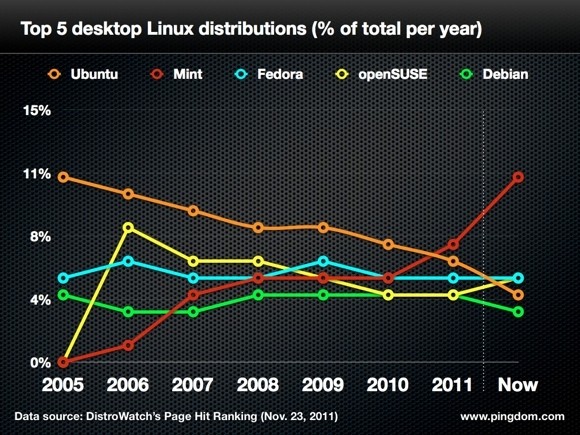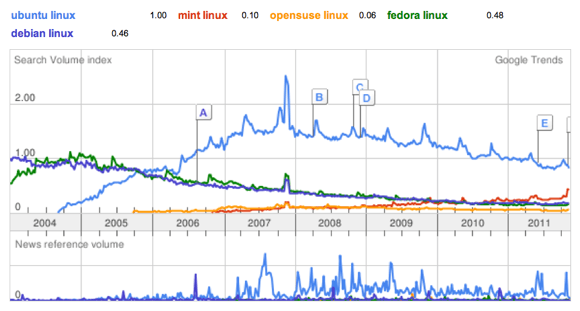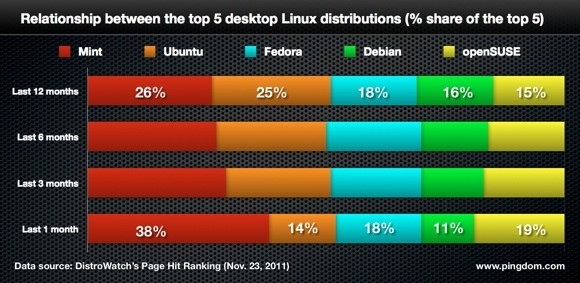Leeky
Posts: 3,357 +116
It has been an interesting year for Ubuntu and its backer, Canonical. Unity arrived amid much speculation in its April release of Ubuntu 11.4, with many questioning why Canonical needed to be moving away from Gnome's desktop environment. Unity makes sense for those new to Linux, but many power users found it frustrating to work with. The initial fallback into the old Gnome 2.x environment when lacking 3D acceleration just confused matters. Now at least, with the release of 11.10, Unity functions with or without 3D acceleration, providing a more consistent environment. But the latest figures suggest differently for the once dominant Linux distribution.

The graph, representative of page hit rankings from the last six years shows a mostly continuous decline in Ubuntu. It looks even worse when you look at the last 30 days page hit rankings. Ubuntu manages only fourth place, despite having released its new version, 11.10, only last month. To be fair, three of the top four distributions have released new versions in the last month or so, although interestingly Mint is not one of them. The figures should be fairly accurate when taking into account the extra attention they receive around release dates, with people scrambling to try their preferred Linux as it hits the download servers.
I think it's fair to suggest most of those new to Linux are unlikely to be viewing Distrowatch's website, though. Therefore, we'll look at Google's Trends tool to see search result statistics and gauge interest in each distro.

The graph above shows a continuous downward trend for Ubuntu, with Linux Mint slowly increasing in popularity and spiking much higher in the last six months to a year. Also decreasing are Fedora and Debian, although their fall is nowhere near as pronounced as Ubuntu is.
Ironically, the core release of Linux Mint is based on a snapshot of Ubuntu. They chose to keep to the Gnome environment, however, with customization and tweaks to the menu system. It is therefore a natural progression for existing users of Ubuntu, with the same available packages, package management tools and the same underpinnings that many users are already accustomed to from using Ubuntu.

Viewing the top five distributions in the above chart it does give some credence to the notion that Unity's release corresponds with a larger than expected reduction in Ubuntu's share. In the last 12 months, Ubuntu has reduced from 25 percent to just 14 percent, with Mint and openSUSE gaining ground in the top five. Mint increased its page hit ranking by 12 percent in the 12 month period alone.
However, it is important to point out that Canonical prefers to keep its different versions of Linux separate, so Ubuntu, Kubuntu, Lubuntu, Xubuntu all have individual listings on Distrowatch's page hit rankings. Mint on the other hand, bundles its different versions (including a Debian-based release) into one page ranking. This is obviously going to push the general outcome of the results in Mint's favor.
It could be that users are fed up with Unity and the direction Canonical is driving Ubuntu and are naturally progressing on to Linux Mint. The data does make it reasonable to assume that Unity has had at least some impact on these figures. That said, it is hard to really confirm a definitive answer for the reasons behind its decline. Any Ubuntu users -- or Linux Mint converts -- in the house? We'd love to hear your thoughts.
https://www.techspot.com/news/46401-ubuntu-popularity-in-downward-spiral-is-unity-to-blame.html